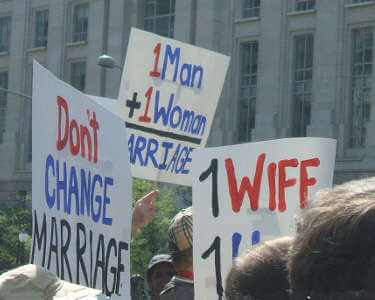
The district already recognizes same-sex marriages performed elsewhere in the U.S., but the law Councilman David Catania proposed would allow the marriages to originate there.
The bill, called the “Religious Freedom and Civil Marriage Equality Amendment Act of 2009,” is expected to pass in the 13-member city council, and has support from the city’s mayor, according to the Associated Press. But it also must be permitted by Congress, which can overturn district legislation.
Traditional marriage supporters say the battle for marriage in District of Columbia has national implications because of Congress’ involvement in the district’s laws. They say gay marriage legislation in Washington, D.C., directly challenges the federal Defense of Marriage of Act (DOMA), which defines marriage as the union of one man and one woman and prevents states from having to recognize same-sex marriages performed elsewhere.
Even without the district marriage bill, DOMA has been under attack in recent months. Several lawsuits have challenged its constitutionality, and the Obama administration called for its repeal in a brief filed in August.
In an attempt to block the expected District of Columbia gay marriage bill, Bishop Harry Jackson, chairman of the Stand4MarriageDC coalition, filed a request with the district Board of Elections and Ethics in September seeking a public vote next year to define marriage as the union of one man and one woman. The Elections Board will hold a hearing later this month on whether the proposal qualifies for the ballot.
Jackson, who is also pastor of Hope Christian Church in Beltsville, Md., said Tuesday that District of Columbia residents have a constitutional right to vote on the definition of marriage. He added that the campaign against gay marriage is not rooted in bigotry, as some critics have claimed.
“I can unequivocally declare that my concerns about gay marriage are anchored in my love for the community and all of its people,” he said. “‘Let the people vote’ is the cry that is rising among the many ministers and churches in the D.C. area.”












































